Overall Vista Performance: XP vs. Vista vs. Vista x64
Benchmarking in Vista is an extremely difficult task, thanks to features like SuperFetch designed to improve performance at the sacrifice of repeatability. We're in love with SuperFetch as a feature, but it does make our jobs a bit more difficult as we have to be very mindful of what has been cached into main memory and how that impacts the performance of our benchmarks. Testing difficulties under Vista are compounded by the fact that our major test suites don't work under the new OS. SYSMark and PC WorldBench simply won't run and thus we have to rely on individual application tests and home-brew scripts to measure performance.
Our goal for this article was to find out if Windows Vista, on modern day hardware, continues to be slower than Windows XP as it has been in previous beta and RC versions. The secondary goal is to look at x64 performance to see if it too has changed behavior, to the point where you no longer need to worry about losing 32-bit performance if you move to the 64-bit version of Vista. We ran a handful of application tests to compare the three OSes (XP, Vista and Vista x64), and later on we'll focus on gaming tests as well to showcase graphics performance.
PCMark '05 Performance
Despite looking quite synthetic, PCMark has grown into a nice lightweight alternative to the big application suite benchmarks like SYSMark. It was also one of the first benchmarks to get official Vista support, although it remains a 32-bit only test.
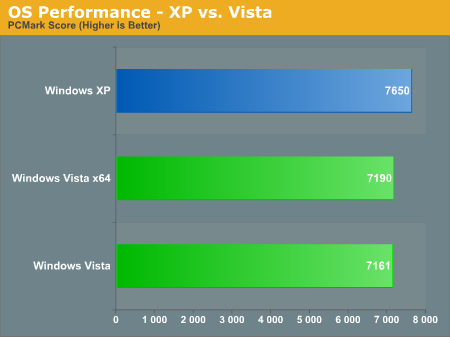
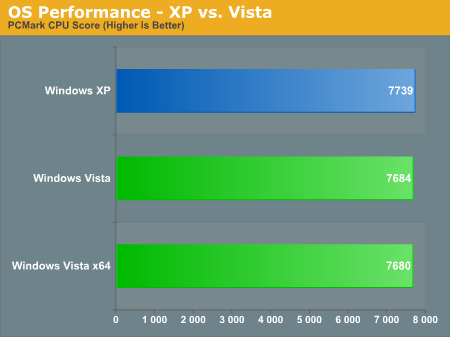
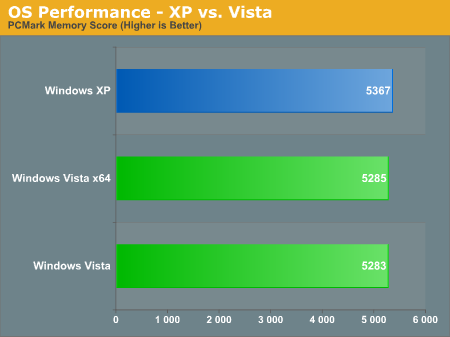
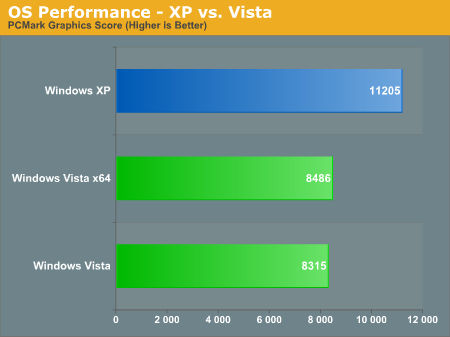
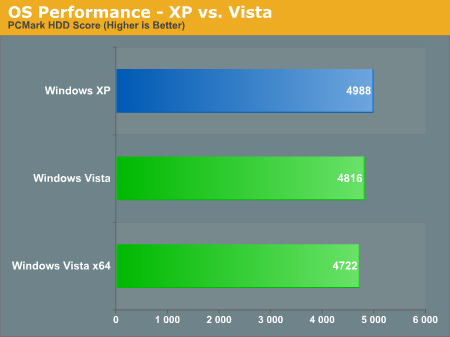
Performance under PCMark is fairly close between Vista and XP, with XP generally holding on to a 1% - 4% performance advantage in most of the categories. The only exception to the rule is the graphics score of PCMark which has XP at around 35% ahead of Vista, but we'll address graphics performance shortcomings of Vista later in the article.
The difference between the 32-bit and 64-bit versions of Vista are hardly pronounced, with the two being evenly matched across the board. Once again, remember that PCMark is a 32-bit benchmark so it is running in Windows on Windows (WOW64) mode. That it can remain competitive is good news, but whether that's because WOW64 works well in all cases or it is merely optimized for PCMark05 remains to be seen.
3DMark '06 Performance
We chose to include 3DMark '06 performance here instead of with our game tests to look at the gaming performance of Vista on a system level rather than a GPU level:
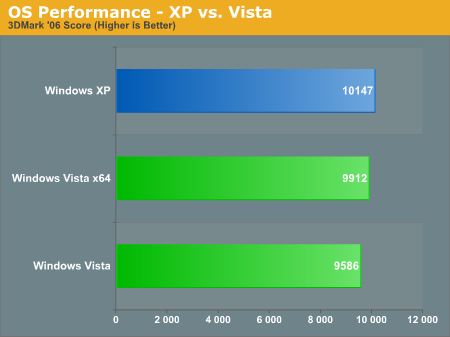
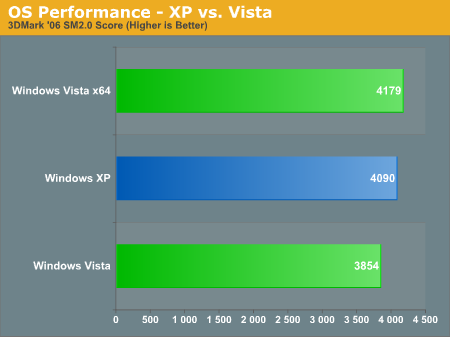
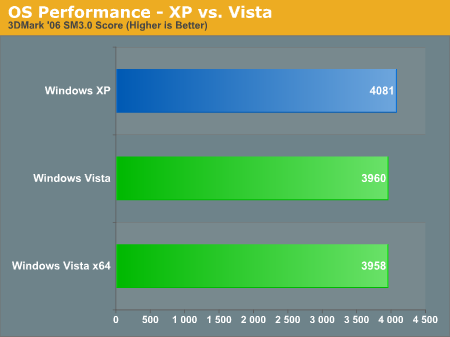
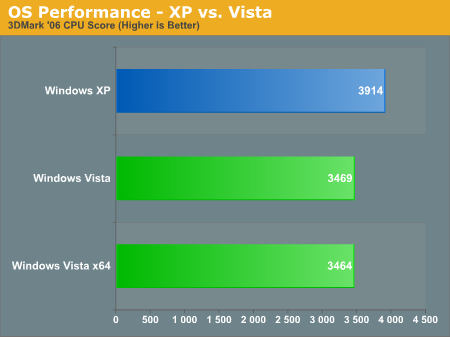
Overall XP is about 6% faster than Vista, although the 3DMark06 CPU score is nearly 13% higher on XP than it is on Vista. As a 32-bit benchmark, it's once again good to see no negative performance difference between the Vista x86 and x64 versions.
Benchmarking in Vista is an extremely difficult task, thanks to features like SuperFetch designed to improve performance at the sacrifice of repeatability. We're in love with SuperFetch as a feature, but it does make our jobs a bit more difficult as we have to be very mindful of what has been cached into main memory and how that impacts the performance of our benchmarks. Testing difficulties under Vista are compounded by the fact that our major test suites don't work under the new OS. SYSMark and PC WorldBench simply won't run and thus we have to rely on individual application tests and home-brew scripts to measure performance.
Our goal for this article was to find out if Windows Vista, on modern day hardware, continues to be slower than Windows XP as it has been in previous beta and RC versions. The secondary goal is to look at x64 performance to see if it too has changed behavior, to the point where you no longer need to worry about losing 32-bit performance if you move to the 64-bit version of Vista. We ran a handful of application tests to compare the three OSes (XP, Vista and Vista x64), and later on we'll focus on gaming tests as well to showcase graphics performance.
PCMark '05 Performance
Despite looking quite synthetic, PCMark has grown into a nice lightweight alternative to the big application suite benchmarks like SYSMark. It was also one of the first benchmarks to get official Vista support, although it remains a 32-bit only test.





Performance under PCMark is fairly close between Vista and XP, with XP generally holding on to a 1% - 4% performance advantage in most of the categories. The only exception to the rule is the graphics score of PCMark which has XP at around 35% ahead of Vista, but we'll address graphics performance shortcomings of Vista later in the article.
The difference between the 32-bit and 64-bit versions of Vista are hardly pronounced, with the two being evenly matched across the board. Once again, remember that PCMark is a 32-bit benchmark so it is running in Windows on Windows (WOW64) mode. That it can remain competitive is good news, but whether that's because WOW64 works well in all cases or it is merely optimized for PCMark05 remains to be seen.
3DMark '06 Performance
We chose to include 3DMark '06 performance here instead of with our game tests to look at the gaming performance of Vista on a system level rather than a GPU level:




Overall XP is about 6% faster than Vista, although the 3DMark06 CPU score is nearly 13% higher on XP than it is on Vista. As a 32-bit benchmark, it's once again good to see no negative performance difference between the Vista x86 and x64 versions.










105 Comments
View All Comments
thebrown13 - Thursday, February 1, 2007 - link
This is TOTALLY false. Microsoft allows content providers to do what they want with their content. Again, THE CONTENT PROVIDERS DECIDE WHAT THEIR CONTENT PLAYS ON. MICROSOFT DECIDES NOTHING.MAIA - Thursday, February 1, 2007 - link
The architecture is still x86 with 64-bit extensions. The correct naming should be 32-bit x86 and 64-bit x86. Although some vendors use the x64 "slang", this only serves to create more confusion, making people believe it's a different architecture. More, editors and reviewers should use the correct definitions, they also have an educating factor which have to live up by a good standart.Ryan Smith - Thursday, February 1, 2007 - link
It makes little sense on our part to use something different than Microsoft's own terminology here when talking about Vista. The x86-64/EMT64/AMD64 versions of Vista are all called Vista * x64, so we're going to be consistent on using Microsoft's naming to avoid possible confusion among Windows versions.Myrandex - Thursday, February 1, 2007 - link
Eh I don't know how x64 can get confusing, but x86_64 is pretty typical as well.smitty3268 - Thursday, February 1, 2007 - link
Actually, it is a new architecture that just happens to be backwards compatible with x86. That is why there are twice the number or registers available and not just the same amount doubled in size. You're right that x64 is not the correct name, (it's technically called x86-64) but what does it matter? Everyone knows what it means.Gunlance - Thursday, February 1, 2007 - link
I wish I could agree about the new installer. My experience with trying to boot windows vista so far is worse than when I learned how to put NetBSD on an Apple G3.In fact I am still trying to get into the Windows Vista setup as I type this comment. I have been up all night :( I simply just don't get it. Every OS I have ever put on my desktop at least boots, and the vista beta's installed fine. Ugh.
The article was great! Heh. It has made me a bit more frustrated though. Because here I am with vista but still only being able to read about.
erwos - Thursday, February 1, 2007 - link
Your OpenGL performance numbers are radically higher than what Tom's has. Could you comment on the drivers and installation that you used?Ryan Smith - Thursday, February 1, 2007 - link
Normally I tend to avoid commenting on anything involving competitors, but...Assuming I'm looking at the right article here, they were using the Catalyst 8.31.100.3.2.1 driver, which was released back in December. We were using the Catalyst 7.1 driver(version # 8.33.something). ATI did not include an OpenGL driver until 7.1(and just barely at that).
ktgktg - Thursday, February 1, 2007 - link
I'm surprised that the article didn't mention how much ReadyBoost could lower the boot time. A member of notebooreview forums claimed that http://forum.notebookreview.com/showthread.php?t=1...">he lowered the boot time on a laptop (slower HD) from 80 to 43 seconds (including POST) with a 2 GB SD card. Remember that http://en.wikipedia.org/wiki/Comparison_of_memory_...">SD cards are slow compared to USB and CF. Although they're all slow compared to RAM, they have the benefit of storing the data until next boot.SuperFetch seems to be just another reason for using standby mode.
yacoub - Thursday, February 1, 2007 - link
Any word on FireFox compatibility with Vista? That is, does it run just as flawlessly as it does under XP x86 and x64?Just wondering. The comment on the Conclusions page about IE 7+ being the new standard for Safari is what made me think to ask.